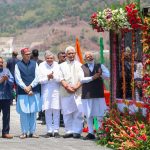In an important step to defuse the festering three-month crisis in the Himalayan state, the Nepali government has agreed to accept some of key demands of Madhesis, including proportional representation and delimitation of constituencies. India, which has been blamed by some sections in Nepal for stoking the Madheshi agitation, promptly welcomed steps by the Nepali Cabinet to amend the new Constitution. However, the amendment proposals have been rejected by the Madhesi groups, with the main United Madhes Democratic Front (UMDF) calling them “a disappointment”. The maximalist posture of Madhesi leaders has raised questions whether the move would lead to the end of the three-month-old blockade at the India-Nepal border that has caused a humanitarian crisis.
Holding an emergency meeting of the Nepal Cabinet on December 21, Nepal’s Prime Minister K.P. Sharma Oli promised to address the contentious issues of demarcation of States, delimitation of constituencies, proportional representation for Madhesis, and strict citizenship rules. Responding positively to the proposals that include amending the Constitution, India’s external affairs ministry hoped that it would pave the way for the resolution of the impasse. “The government of India welcomes these developments as positive steps that help create the basis for a resolution of the current impasse in Nepal. We urge all Nepali political forces to now demonstrate the necessary maturity and flexibility to find a satisfactory solution to the constitutional issues through constructive dialogue in an agreed time-frame”.
Nepal’s Deputy Prime Minister Kamal Thapa is understood to have consulted External Affairs Minister Sushma Swaraj over the last week before finally taking the solution package to the Madhesi groups. Mr Thapa, who returned from London, had supposedly spoken to Ms.Swaraj from London to inform her of the developments.
Expressing disappointment, the Madhesi protesters have, however, described the solution package as a betrayal of promises made by Mr.Oli. “We are deeply disappointed by the solution package as it leaves out the main issue of our land and identity,” said Rajinder Mahato of UMDF. The UMDF responded to India’s welcome of the solution package as a negative development with Mr Mahato saying that India should have consulted the Madhesi leaders before issuing the statement praising the statement.
“We want Kathmandu to clearly demarcate the province of Madhes. We will not end our agitation without the demarcation of the province,” said Upendra Yadav of UMDF. Apart from the issue of absence of demarcation and a clear timeline, the solution package was also vague in commitments on the promised constitutional amendments, Mr Yadav added.
Author Profile
- India Writes Network (www.indiawrites.org) is an emerging think tank and a media-publishing company focused on international affairs & the India Story. Centre for Global India Insights is the research arm of India Writes Network. To subscribe to India and the World, write to editor@indiawrites.org. A venture of TGII Media Private Limited, a leading media, publishing and consultancy company, IWN has carved a niche for balanced and exhaustive reporting and analysis of international affairs. Eminent personalities, politicians, diplomats, authors, strategy gurus and news-makers have contributed to India Writes Network, as also “India and the World,” a magazine focused on global affairs.
Latest entries
 DiplomacyOctober 4, 2025UNGA Resolution 2758 Must Not Be Distorted, One-China Principle Brooks No Challenge
DiplomacyOctober 4, 2025UNGA Resolution 2758 Must Not Be Distorted, One-China Principle Brooks No Challenge India and the WorldJuly 26, 2025MPs, diplomats laud Operation Sindoor, call for national unity to combat Pakistan-sponsored terror
India and the WorldJuly 26, 2025MPs, diplomats laud Operation Sindoor, call for national unity to combat Pakistan-sponsored terror India and the WorldJuly 25, 2025When Fire Ends, Diplomacy Begins
India and the WorldJuly 25, 2025When Fire Ends, Diplomacy Begins India and the WorldJuly 16, 2025Operation Sindoor and its Aftermath: India’s Successful Diplomatic Outreach
India and the WorldJuly 16, 2025Operation Sindoor and its Aftermath: India’s Successful Diplomatic Outreach








